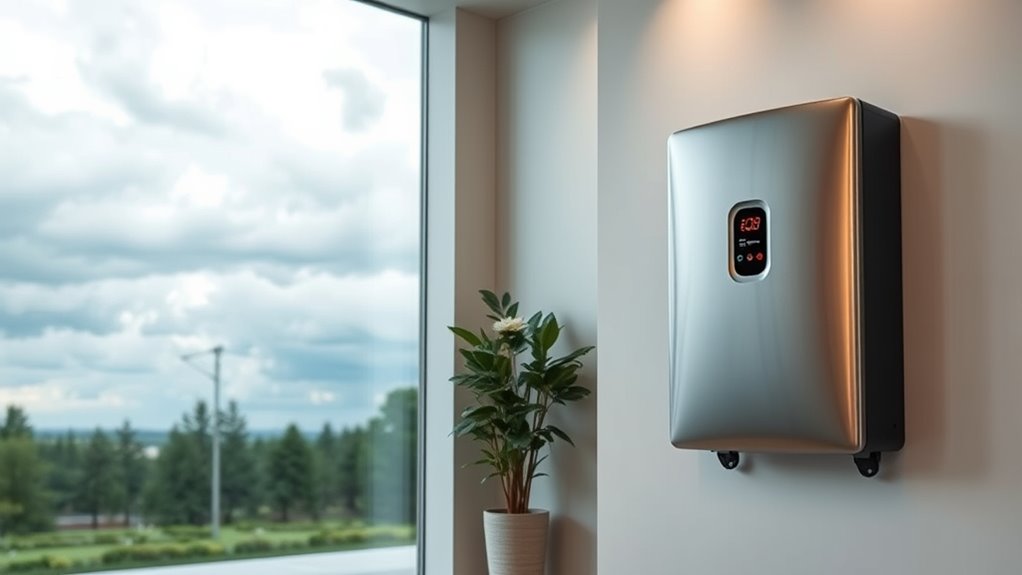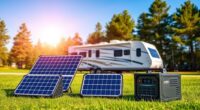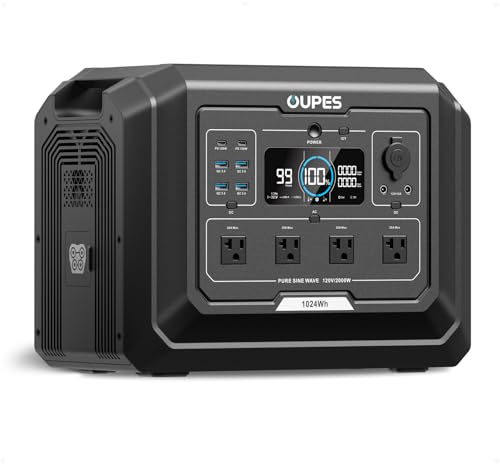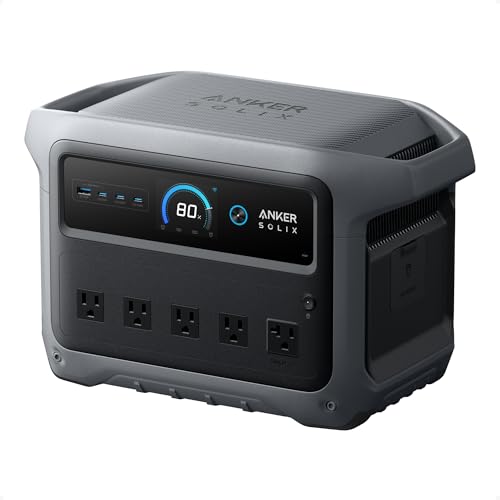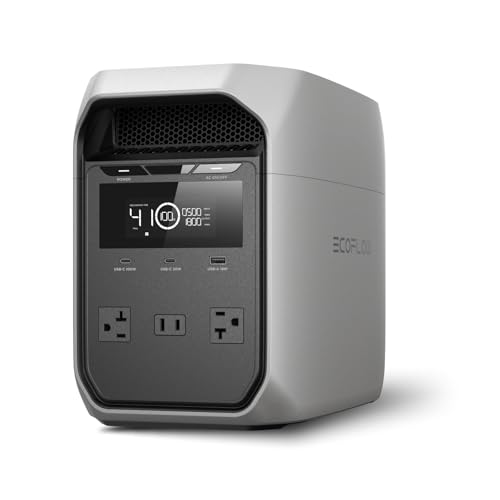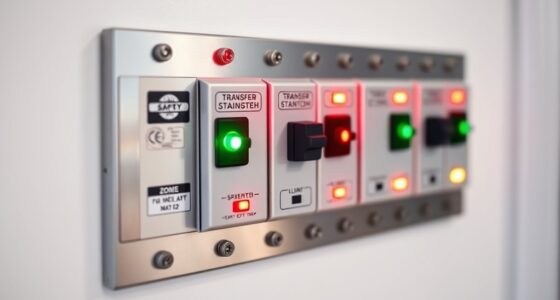If you’re looking for reliable home energy storage systems to keep power on during outages, I recommend considering options like the EF ECOFLOW DELTA Pro, OUPES Exodus 2400, and AFERIY portable stations with capacities from 1024Wh to over 3800Wh. These units offer fast charging, multiple outlets, and long cycle lives with safe LiFePO4 batteries. Keep exploring, and you’ll find the best solution tailored to your needs and budget.
Key Takeaways
- Prioritize systems with high capacity (e.g., 3000Wh+) and long cycle life (over 3,000 cycles) for reliable backup during outages.
- Choose energy storage solutions with fast recharging capabilities, such as solar or AC fast charging, to ensure readiness.
- Opt for expandable systems like the EcoFlow DELTA Pro or similar to increase storage capacity as needed.
- Ensure safety features like BMS protection and durable LiFePO4 batteries for long-term, safe operation during prolonged outages.
- Consider portability and ease of integration with your home system for seamless, reliable power backup.
Portable Solar Generator with 60W Solar Panel and 300W Power Output
If you’re looking for a portable energy solution that’s perfect for outdoor adventures or emergency backup, the ZeroKor 300W Portable Solar Generator is an excellent choice. It features a foldable 60W solar panel with high efficiency, allowing quick recharging via sunlight. The device delivers up to 300W of power, supporting smartphones, laptops, small devices, and camping gear. Weighing just over 5 pounds, it’s lightweight and compact, making it easy to carry. Multiple outlets, including USB, DC, and AC, ensure versatile device charging. Built-in safety protections and a durable design make it reliable for off-grid use, emergencies, or outdoor activities.
Best For: outdoor enthusiasts, campers, and emergency preparedness users seeking a lightweight, reliable portable power source.
Pros:
- High efficiency 60W solar panel for quick recharging in sunlight
- Multiple charging options including USB, DC, and AC outlets for versatile device compatibility
- Lightweight and compact design, ideal for portability and outdoor use
Cons:
- Supports devices only up to 300W, limiting use with high-power appliances
- Prolonged inactivity may trigger protection mode, requiring regular use to maintain performance
- Battery capacity (280Wh) may be insufficient for extended power needs without frequent recharging
OUPES Mega 1 Portable Power Station (1024Wh LiFePO4 Battery)
The OUPES Mega 1 Portable Power Station is an ideal choice for anyone seeking reliable, high-capacity portable power, especially during outdoor adventures or emergencies. Its 1024Wh LiFePO4 battery offers long-lasting, safe energy, and can be expanded to 5kWh with an extra battery. Weighing just 27.8 pounds, it’s portable yet powerful enough to run appliances like refrigerators or CPAP machines. With multiple outlets—including AC, USB-C, USB-A, and DC—it supports versatile device charging. Fast recharge options via solar, AC, or car make it adaptable. Plus, its smart app control simplifies management, making it a dependable, efficient backup power solution.
Best For: outdoor enthusiasts, emergency preparedness, and home backup users seeking a portable, high-capacity, versatile power solution.
Pros:
- High-capacity 1024Wh LiFePO4 battery with expandable options up to 5kWh for extended power needs
- Multiple output ports including AC, USB-C, USB-A, and DC for versatile device charging
- Supports fast recharge via solar, AC, or car, with smart app control for easy management
Cons:
- Weighs 27.8 pounds, which may be less portable for some users
- No batteries are included with the power station, requiring additional purchase for expansion
- Slightly higher initial cost compared to smaller or less feature-rich portable power options
EF ECOFLOW Portable Power Station (DELTA Pro)
For anyone seeking reliable, high-capacity power on the go or during emergencies, the EF ECOFLOW Portable Power Station (DELTA Pro) stands out with its expandable 3600Wh LiFePO4 battery. It can be increased to 25kWh with extra batteries or smart generators, supporting nearly all heavy-duty devices. With 3600W AC output, expandable to 4500W with X-Boost technology, it handles multiple devices simultaneously through 15 ports. Fast charging options—like 1.8 hours via wall outlets and solar—make recharging quick and efficient. The EcoFlow app allows remote monitoring, ensuring safe, flexible operation whether at home, camping, or during power outages.
Best For: individuals seeking a reliable, high-capacity portable power solution for home backup, outdoor adventures, or emergency use.
Pros:
- Expandable capacity up to 25kWh with extra batteries or smart generators for versatile power needs.
- Fast charging options, including 1.8 hours via wall outlets and solar, for quick recharging on the go.
- Multiple output ports (15 total) support simultaneous charging of various devices and appliances.
Cons:
- The initial cost may be high for some users, especially with additional batteries or accessories.
- Heavier and bulkier compared to smaller portable power units, which might affect portability.
- Requires internet connection for remote app monitoring, which could be limiting in remote areas.
EF ECOFLOW Portable Power Station DELTA 2 (1024Wh, Solar Generator)
The EF ECOFLOW Portable Power Station DELTA 2 stands out as an excellent choice for anyone seeking reliable off-grid power, thanks to its impressive 1024Wh LiFePO4 battery that supports fast charging and expanded capacity. It delivers up to 1800W continuous power, handling most household appliances, and can be expanded from 1kWh to 3kWh with additional batteries. Quick recharging is possible via wall outlets in just 80 minutes or through solar panels with up to 500W input. Its versatile design includes 15 outlets, making it perfect for backup power, camping, or RV use, all while ensuring safety and durability.
Best For: outdoor enthusiasts, emergency preparedness, and off-grid living who need reliable, portable, and expandable power solutions.
Pros:
- Large 1024Wh LiFePO4 battery with over 3,000 charge cycles for long-term durability
- Supports fast charging from wall outlets (80 minutes to 80%) and solar input up to 500W
- Versatile with 15 outlets, capable of powering most household appliances up to 1800W
Cons:
- The initial purchase cost may be high compared to traditional generators
- Expanded capacity requires additional batteries, increasing overall size and weight
- Limited to 500W solar input, which may be slower for larger off-grid setups
Anker SOLIX C1000 Gen 2 Portable Power Station
If you’re seeking a reliable portable power solution for home backup or outdoor adventures, the Anker SOLIX C1000 Gen 2 stands out with its impressive 2,000W continuous output and rapid recharge capabilities. It features a 1,024Wh LiFePO4 battery designed for over 4,000 charge cycles and a 10-year lifespan. Recharging is quick—just 49 minutes with HyperFlash technology or 1.8 hours via solar input. Weighing only 24.9 pounds and compact, it offers 10 ports and 9 outlets, plus a 10 ms UPS backup for critical devices. Its smart power management via the Anker app makes it a versatile, durable choice for both emergencies and outdoor use.
Best For: outdoor enthusiasts, homeowners, and emergency preparedness individuals seeking a reliable, fast-charging portable power station with long-lasting battery life.
Pros:
- Rapid recharge in just 49 minutes with HyperFlash technology
- Long-lasting LiFePO4 battery with over 4,000 charge cycles and 10-year lifespan
- Compact and lightweight design weighing only 24.9 pounds with multiple ports for versatile device charging
Cons:
- Higher price point compared to basic portable power stations
- Limited to 600W solar input, which may extend recharge time in cloudy conditions
- Requires access to a power outlet or solar panels for recharging, which may not be ideal for all outdoor scenarios
EF ECOFLOW Portable Power Station DELTA 3 (1024Wh)
With its powerful 1024Wh capacity and 1800W continuous output, the EF ECOFLOW Portable Power Station DELTA 3 is an excellent choice for homeowners seeking reliable backup power during outages or for outdoor adventures. It can run appliances like refrigerators, microwaves, and laptops, with an expandable capacity up to 2600W using X-Boost technology for heavier loads. Fast charging from 0 to 80% takes just 45 minutes, and solar recharging with a 500W panel fully recharges in about 2.5 hours. Its LiFePO4 batteries guarantee over ten years of reliable use, while safety features and smart app control make it a versatile, durable, and user-friendly power solution.
Best For: homeowners, outdoor enthusiasts, and RV travelers seeking reliable, portable backup power for appliances, electronics, and off-grid adventures.
Pros:
- High capacity of 1024Wh with expandable up to 2600W using X-Boost technology
- Fast charging from 0 to 80% in just 45 minutes and full recharge in 2.5 hours with solar or AC power
- Built-in LiFePO4 batteries rated for over 10 years of reliable use and advanced safety features including <10ms UPS
Cons:
- May be heavier and bulkier compared to smaller portable power units
- Limited to 1024Wh base capacity without expansion, which might be insufficient for very high energy demands
- Higher cost relative to basic portable power stations with lower capacity
Portable Power Station 28,000mAh LiFePO4 Battery with Solar Panel (Optional)
A portable power station with a 28,000mAh LiFePO4 battery and optional solar panel is ideal for anyone seeking reliable, on-the-go energy. Its compact design, roughly the size of a phone, fits easily into backpacks or pockets, and the soft handle makes it simple to carry. With support for fast charging and multiple output ports—AC, USB-C, USB-A, and DC—it can power most digital devices quickly and safely. The LiFePO4 battery offers over 3,500 cycles, ensuring durability and longevity. Plus, the optional solar panel lets me harness solar energy, making it a versatile solution for camping, emergencies, or outdoor adventures.
Best For: outdoor enthusiasts, campers, and emergency preparedness individuals seeking a compact, reliable portable power source for multiple devices.
Pros:
- Compact and lightweight design easily fits into backpacks or pockets for portability.
- Supports ultra-fast charging and multiple output options, compatible with a wide range of devices.
- Long-lasting LiFePO4 battery with over 3,500 charge cycles ensures durability and safety.
Cons:
- Limited to 89.6Wh, which may not power larger appliances or high-energy devices for extended periods.
- Optional solar panel purchase required separately for solar charging capability.
- Slightly higher price point due to advanced battery technology and multiple features.
Portable Power Station 300W with Solar Generator and Lithium Battery
The Portable Power Station 300W is an ideal choice for anyone who needs reliable, portable energy on the go, whether for camping, travel, or emergency backup. With a 230.88Wh capacity and 330W (600W surge) pure sine wave AC output, it can power laptops, phones, lights, fans, and small appliances like mini-refrigerators and TVs. Weighing just 7.3 pounds, it’s compact and easy to carry. It features upgraded lithium batteries, advanced BMS for safety, and supports three charging methods: AC, solar, and vehicle. The included 40W solar panel maximizes solar charging efficiency, making it a versatile, efficient, and safe power solution for outdoor and emergency use.
Best For: outdoor enthusiasts, travelers, and emergency preparedness individuals seeking a portable, reliable power source for small appliances and electronic devices.
Pros:
- Compact and lightweight design (7.3 pounds) for easy portability
- Multiple charging options including AC, solar, and vehicle outlets with efficient MPPT technology
- Supports fast charging with USB-C PD 60W and multiple device simultaneous use
Cons:
- Limited capacity (230.88Wh) may not power larger or high-wattage appliances for extended periods
- Only 300W continuous power output, restricting use with more power-intensive devices
- Solar charging depends on sunlight availability and may take longer to fully recharge
Portable Power Station 1800W (Surge 3000W) Lithium Battery Generator
If you’re seeking reliable backup power that can handle a variety of essential devices during outages, the Portable Power Station 1800W (Surge 3000W) Lithium Battery Generator is an excellent choice. It features a high-capacity 1382.4Wh LiFePO4 battery, ensuring dependable home backup and reducing disruption during emergencies. With rapid charging—reaching 80% in just 1 hour and full in 1.3 hours—it’s perfect for urgent needs. Its versatile 1800W AC output supports everything from small appliances to sensitive electronics, and automatic UPS switching protects your devices. Lightweight and efficient, it’s ideal for camping, RV trips, or off-grid living. Plus, backed by a 5-year service, it offers peace of mind.
Best For: individuals seeking reliable, fast-charging portable power solutions for home backup, camping, RV trips, or off-grid living to ensure essential devices stay powered during outages or remote adventures.
Pros:
- High-capacity 1382.4Wh LiFePO4 battery provides dependable and long-lasting power backup
- Rapid charging in just 1.3 hours allows quick turnaround for urgent power needs
- Versatile 1800W AC output supports a wide range of appliances and sensitive electronics
Cons:
- Cannot be shipped to PO Boxes, requiring a physical address for delivery
- Does not support mobile phone induction charging directly
- Heavier than smaller portable generators, which may affect portability for some users
EF ECOFLOW DELTA 3 Portable Power Station
For those seeking a versatile and reliable portable power solution, the EF ECOFLOW DELTA 3 stands out with its rapid charging capabilities and expandable design. It charges fully in just 56 minutes using solar and AC power, and reaches 80% in only 30 minutes. Its modular design allows expansion up to 5kWh with compatible batteries like the DELTA 3 Extra Battery, which is lighter and smaller. Powered by durable LiFePO4 cells, it offers 4000 cycles and a 10-year lifespan. Capable of powering 13 appliances simultaneously, it supports high-demand devices with 1800W AC output and X-Boost technology, making it perfect for emergencies or off-grid use.
Best For: outdoor enthusiasts, homeowners, and off-grid users seeking a reliable, fast-charging, and expandable portable power station for emergencies, camping, and home backup.
Pros:
- Rapid full charge in just 56 minutes using solar and AC power combined
- Supports expansion up to 5kWh with compatible lightweight battery packs
- Durable LiFePO4 cells with 4000 cycles and a 10-year lifespan
Cons:
- May be relatively heavy when fully expanded, impacting portability
- Higher initial cost compared to smaller or less capable units
- Limited to EcoFlow ecosystem for expansion and connectivity
OUPES Exodus 1200 Portable Power Station
When I need reliable backup power or portable energy on the go, the OUPES Exodus 1200 Portable Power Station stands out with its impressive 992Wh capacity and 1200W rated output. It can power essentials for days—like a fridge for over 25 hours or keep phones charged 60+ times. With 10 versatile ports, including AC outlets, USB-C PD, and car sockets, I can run laptops, mini-fridges, and projectors simultaneously. Its durable LiFePO4 batteries support over 3,000 cycles, and it’s safe, with smart app control and a 5-year warranty. Weighing just 23.5 pounds, it’s perfect for camping, home backup, or road trips.
Best For: outdoor enthusiasts, families needing reliable home backup, and professionals requiring portable power on the go.
Pros:
- High-capacity 992Wh battery supports powering multiple devices simultaneously for extended periods
- Versatile ports including AC outlets, USB-C PD, and car sockets for wide device compatibility
- Lightweight (23.5 lbs) and portable design ideal for camping, road trips, and emergency use
Cons:
- Limited solar input capacity (up to 240W), which may prolong recharging times in off-grid scenarios
- Relatively higher price point compared to smaller portable power options
- No built-in wheels, which could make transportation less convenient over rough terrains
Jackery Portable Power Station Explorer 300
Looking for a portable power solution that can keep your devices charged during outdoor adventures or emergencies? The Jackery Explorer 300 is a lightweight, compact power station with a 293Wh lithium-ion battery, weighing just 7.1 pounds. It offers safe, stable 300W power through two AC outlets and supports up to six devices simultaneously, including laptops, drones, and cameras. With multiple ports—USB-C, USB-A, and a DC car port—it’s versatile and easy to recharge via wall, car, or solar panel. Fast charging options and an efficient MPPT controller make it perfect for off-grid use, camping, or backup power during outages.
Best For: outdoor enthusiasts, campers, and emergency preparedness users needing portable, reliable power for multiple devices.
Pros:
- Lightweight and compact design weighing only 7.1 pounds for easy portability.
- Supports up to 6 devices simultaneously with multiple ports including USB-C, USB-A, and AC outlets.
- Fast recharging options via wall, car, or solar panel with an efficient MPPT controller.
Cons:
- Limited to a 293Wh capacity, which may not power larger appliances for extended periods.
- No internal batteries; requires external charging sources.
- Slightly higher price point compared to basic portable chargers with lower capacity.
Portable Power Station, 288Wh LiFePO4 Battery with AC Outlet
The Portable Power Station with a 288Wh LiFePO4 battery is an excellent choice for outdoor enthusiasts and emergency preparedness, thanks to its lightweight design and versatile charging options. Weighing only 8.2 pounds and compact enough to carry easily, it features two AC outlets, USB-C PD 60W, and USB-A ports, supporting devices up to 350W. Its advanced BMS guarantees safe operation with protections against overcharge, over-discharge, and short circuits. The LCD display provides real-time power monitoring, while the rear LED offers multiple light modes. With options for solar, car, or wall charging, it’s perfect for powering phones, laptops, small appliances, or CPAP machines during outages or outdoor trips.
Best For: outdoor enthusiasts, campers, and emergency preparedness individuals seeking a lightweight, versatile power source for small devices and appliances.
Pros:
- Compact and lightweight design (8.2 pounds) for easy portability
- Supports multiple charging options including solar, car, and wall outlet
- Equipped with advanced BMS for safe operation and multi-layer protection
Cons:
- Limited to devices within 350W wattage, restricting some high-power appliances
- Does not include solar panels, requiring additional purchase for solar charging
- Battery capacity (288Wh) may not sustain larger or long-duration power needs
AFERIY Portable Power Station (3840Wh, 3600W LiFePO4 Battery)
If you’re seeking reliable backup power that can handle high-demand devices, the AFERIY Portable Power Station is an excellent choice. With a massive 3840Wh capacity and a 3600W LiFePO4 battery, it can power multiple appliances simultaneously, including large electronics and even some home essentials. Its rapid charging—0 to 100% in just 2.5 hours—and support for solar recharge make it versatile for emergencies, camping, or RV use. Built with safety in mind, it features a durable design, a robust BMS, and a 7-year warranty. Its expandability up to 11.5kWh ensures long-term, high-power backup when needed most.
Best For: those seeking a high-capacity, reliable portable power solution for home backup, outdoor adventures, RV living, or emergency preparedness.
Pros:
- Massive 3840Wh capacity with expandable options up to 11.5kWh for long-term power needs.
- Rapid charging from 0 to 100% in just 2.5 hours, including solar recharge support.
- Multiple output ports (5 AC, USB-A, USB-C, DC5521, car socket, XT60) for versatile device charging.
Cons:
- Heavy weight of approximately 104.7 pounds, which may affect portability.
- Solar panels are sold separately, adding to overall cost and setup complexity.
- The large size may require substantial storage space and handling considerations.
OUPES Exodus 2400 Portable Power Station
Need reliable backup power that’s both portable and powerful? The OUPES Exodus 2400 Portable Power Station delivers with a 2400W rated AC output, boosting up to 2600W and surging to 4500W, enough to run appliances or tools during outages or outdoor adventures. Its 2232Wh LiFePO4 battery offers over 3500 cycles, supported by a 5-year warranty, ensuring long-term reliability. At just 45.7 pounds, it’s easy to transport with ergonomic handles. Fast charging—0 to 80% in 1.2 hours—and multiple power options, including solar, make it versatile for home backup, camping, or emergency situations. Smart features and app control add convenience.
Best For: individuals seeking a reliable, portable power solution for home backup, outdoor adventures, or emergency situations with fast recharge capabilities and versatile charging options.
Pros:
- High power output with 2400W rated AC and surge up to 4500W, suitable for running various appliances and tools.
- Long-lasting LiFePO4 battery with over 3500 cycles and a 5-year warranty ensures durability and reliability.
- Compact and portable design weighing only 45.7 pounds with ergonomic handles for easy transport.
Cons:
- The weight of 45.7 pounds may still be challenging for some users to carry over long distances.
- Higher price point compared to smaller or less powerful portable power stations.
- Limited solar input capacity at 800W, which may require longer charging times when using solar power alone.
Factors to Consider When Choosing Home Energy Storage for Power Outages
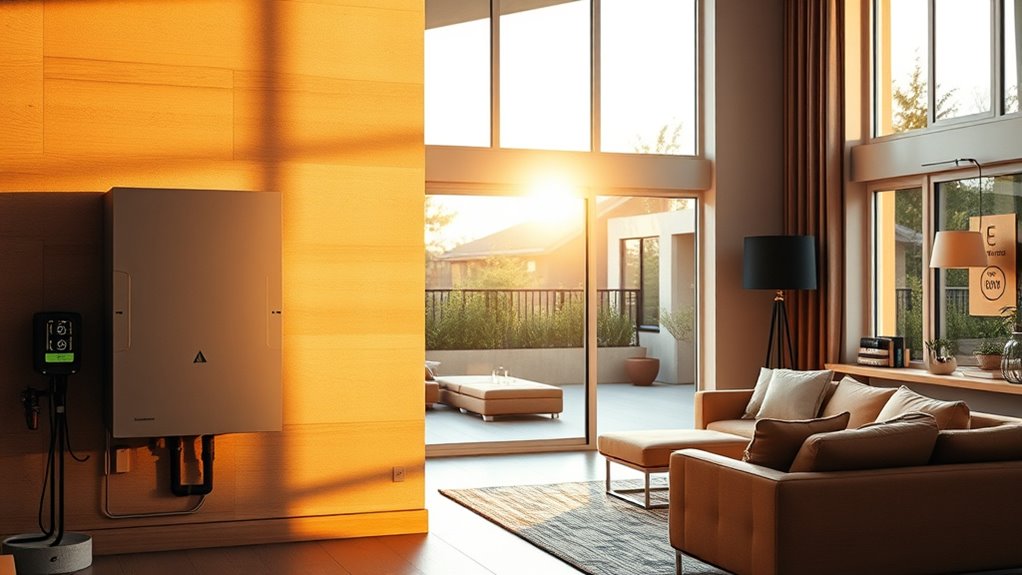
When selecting a home energy storage system for power outages, I consider several key factors. I look at battery capacity to guarantee it meets my energy needs, compatibility with existing systems, and how flexible recharging options are. Safety, cost, and the potential for future expansion also play vital roles in my decision-making process.
Battery Capacity Needs
How much battery capacity do you actually need to keep your essential appliances running during a power outage? First, I recommend calculating the total watt-hours (Wh) required for your critical devices like refrigerators, lights, and medical equipment. Don’t forget to take into account surge wattage, which accounts for short-term power spikes that some appliances need at startup. You should match your battery capacity to the expected duration of outages—aim for enough stored energy to cover the longest anticipated blackout. Also, evaluate the battery’s cycle life to ensure it’ll perform reliably over time. Finally, think about the battery’s efficiency and depth of discharge; maximizing usable capacity helps prevent oversizing, saving you money and space while ensuring your essentials stay powered when it matters most.
Power Output Compatibility
Choosing the right home energy storage system requires careful attention to its power output capabilities. First, verify the system’s continuous wattage output matches or exceeds the total wattage of your essential devices. This prevents overloads and guarantees smooth operation during outages. Check if the system supports multiple outlets like AC, USB-C, USB-A, and DC, so you can power various devices simultaneously. Also, confirm its surge capacity to handle high-startup wattage of appliances such as refrigerators or pumps. Compatibility with your home’s voltage and current ratings is vital to avoid damage or safety issues. Finally, consider whether the system can integrate with your existing wiring or if additional adapters or transfer switches are needed. Proper power output compatibility guarantees reliable, safe operation when you need it most.
Recharging Flexibility
Recharging flexibility is vital for guaranteeing your home energy storage system remains reliable during extended outages. I recommend choosing a system that can recharge from multiple sources like solar panels, wall outlets, and vehicle adapters, providing maximum versatility. Check the charging speed and capacity to verify it can fully recharge quickly, minimizing downtime. Fast-charging features, such as MPPT controllers or high-wattage inputs, are valuable for rapid restoration. Also, consider the battery chemistry; lithium iron phosphate (LiFePO4) batteries offer many recharge cycles with minimal degradation, enhancing longevity. Compatibility with existing or future renewable energy sources is essential for seamless off-grid recharging. By prioritizing these factors, you’ll guarantee your system can reliably recover power during prolonged outages, keeping your home energized when you need it most.
Safety and Durability
Ensuring safety and durability in a home energy storage system is crucial, especially during extended power outages. A top-tier system should feature advanced Battery Management Systems (BMS) that prevent overcharging, over-discharging, short circuits, and thermal runaway, guaranteeing safe operation at all times. Durable solutions often use Lithium Iron Phosphate (LiFePO4) batteries, known for over 3,000 charge cycles and a lifespan of 10 years or more, providing long-term reliability. Safety features like automatic thermal regulation, built-in fuses, and protective casings help prevent overheating, fires, and mechanical damage. Additionally, robust construction with impact-resistant and weatherproof materials shields the system against physical shocks and environmental hazards. Regular maintenance and proper installation are essential to sustain safety and ensure the system’s longevity over time.
Cost and Expansion
Have you considered how the cost and scalability of a home energy storage system impact your long-term energy independence? The initial expense varies widely, from a few hundred dollars for small units to over $10,000 for high-capacity systems. Many options are expandable, allowing you to increase capacity over time by adding batteries or modules, which can be a cost-effective way to adapt to growing energy needs. Keep in mind, expanding your system involves additional hardware, installation, and possible infrastructure upgrades. This flexibility means you can start with a basic setup and scale up as your energy consumption or solar generation increases. Balancing current affordability with future expansion potential is essential for making a smart, long-term investment tailored to your evolving energy requirements.
Frequently Asked Questions
How Long Do These Energy Storage Systems Typically Last During Outages?
During outages, my energy storage system typically lasts between 4 to 12 hours, depending on the size of the battery and your home’s energy use. I’ve found that larger batteries provide longer backup times, especially if I limit high-energy appliances. It’s essential to think about your power needs and choose a system with enough capacity to keep critical devices running until power is restored.
Can These Systems Be Integrated With Existing Home Solar Setups?
Yes, these systems can be integrated with your existing home solar setup. I’ve found that most modern energy storage options are compatible with a variety of solar panels and inverters. You might need some additional equipment or professional installation, but it’s definitely doable. I recommend consulting with a solar professional to guarantee seamless integration, so you can maximize your energy independence and keep power steady during outages.
What Maintenance Is Required to Ensure Optimal Performance?
Think of maintaining your home energy storage like tuning a vintage radio—regular checks keep it humming perfectly. I regularly inspect connections, clean batteries, and update firmware to guarantee peak performance. It’s also crucial to monitor system health through apps and schedule professional maintenance annually. Doing these simple tasks helps your system stay reliable, just like a well-maintained classic car that runs smoothly for years.
Are There Any Safety Concerns With Lithium-Based Batteries?
Yes, there are safety concerns with lithium-based batteries. They can overheat, catch fire, or explode if damaged, improperly installed, or subjected to manufacturing defects. That’s why I always guarantee proper installation, regular inspections, and using certified systems. It’s also important to avoid puncturing or exposing batteries to extreme temperatures. Being cautious helps prevent accidents and keeps my home safe while benefiting from reliable energy storage.
How Do Weather Conditions Affect the Efficiency of Portable Power Stations?
Ever notice how a sudden cold snap or blazing heat seems to impact our gadgets? Weather really affects portable power stations. Extreme cold can reduce their battery efficiency, making them less reliable, while heat can cause overheating and damage. I’ve learned to keep mine in a temperature-controlled space and avoid exposing it to direct sunlight. That way, I guarantee it’s ready when I need it most, regardless of the weather outside.
Conclusion
Choosing the right home energy storage system is like finding the perfect anchor in a storm—it keeps your power steady and reliable when the weather turns rough. With options ranging from portable generators to massive batteries, you can craft a backup plan that feels like a safety net woven just for you. Stay prepared, stay powered, and let these systems be the lighthouse guiding you through any blackout waters.
